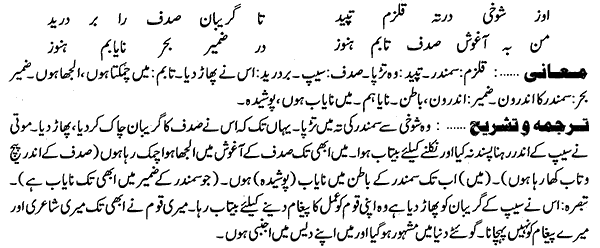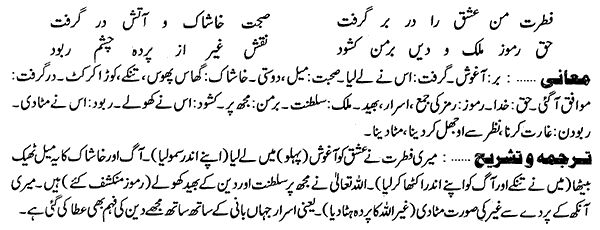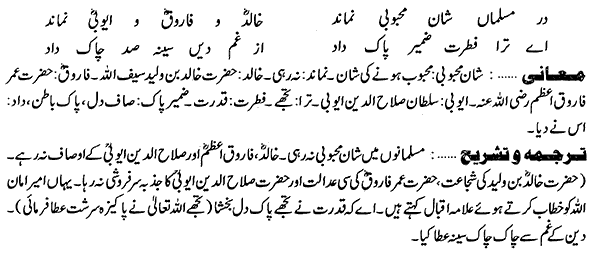Dedicatory Epistle To King Amanullah Khan of Afghanistan
Successful head of a great monarchy,
Youthful in years, old in sagacity,
Inspired practitioner of the royal art,
Possessor of the wisdom of the heart,
With a will as strong as your mountain walls,
And constant circumspection that forestalls
All risks, ambition as high as my thought,
And organising power that has brought
Together feuding tribes, you have untold
Gifts made to you by kings—silver and gold,
Rubies and jewels. O king, son of a king,
Accept from me this humble offering.
Ever since I found out life’s mystery,
It is as if a fire blazed inside me.
My song is a flame of that inner fire—
A song of passion sung on wisdom’s lyre.
That Western sage, that bard of Germany,
That ardent lover of things Pahlavi,
Saluted the East with his great Divan,
That tribute to the poets of Iran
And veritable picture gallery
Of vignettes, all in Persian imagery.
To that salute this book is a reply,
This gleam of moonlight in the Eastern sky.
Without deluding myself, I will dare
To tell you how the two of us compare.
His was the vital spark of the young West;
Mine has been wrung from the East’s aged breast.
A flourishing spring garden gave him birth;
I am a product of a long dead earth.
He was a nightingale that filled with song
An orchard; I am but a desert gong,
A signal for the caravan to start.
We both have delved into the inmost heart
Of being; both of us are messages
Of life in the midst of death’s ravages;
Two daggers, morning‐lustred, mirror‐bright;
He naked; I still sheathed, concealed from
sight.
Two pearls, both precious, both unmatched,
are we,
Both from the depths of an unfathomed sea.
He burst out of the mother‐of‐pearl’s womb,
For he could rest no longer in that tomb.
But I, who still am lying shell‐enshrined,
Have yet to be astir in the sea’s mind.
No one around me knows me properly:
They go away with empty cups from my
Wine‐fount. I offer them a royal state,
With Chosroe’s throne for use as their
footmat.
But they want fairy tales of love from me,
The gaudy trappings of mere poesy.
They are so purblind that they only see
My outside, not the fervid soul in me.
I have made Love my very being’s law:
In me can live together fire and straw
The truths of statecraft and religion both
God has revealed to me; so I am loth
To turn to any other guide. From my
Imagination do the flowers come by
Their hues. Each line of verse that I compose
Is a drop of my rich heart’s blood that flows
From my pen’s point. Do not think poetry
Is merely madness; if this madness be
Complete, then wisdom is its name. Alas!
Vouchsafed this gift, I am condemned to pass
My days in exile in this joyless land,
This India, where none can understand
The things I sing of like a nightingale
With not a tulip, not a rose to hail
Its song—a nightingale singing alone
In some deserted place, sad and forlorn.
So mean is fortune that it favours fools.
Woe to the gifted, who defy its rules!
You see, O king, the Muslims’ sun dimmed by
The darkling clouds that overhang the sky—
The Arab in his desert gone astray;
The way of godliness no more his way;
The Egyptian in the whirlpool of the Nile;
And the Turanian slow‐pulsed and senile;
The Turk a victim of the ancient feud
Of East and West, both covered with his
blood;
No one left like that ardent soul, Salman;
His creed of Love now alien to Iran,
Which has lost all its fervour, all its zest,
The old fire all cold ashes in its breast;
The Indian Muslim unconcerned about
All save his belly, sunk in listless doubt.
The heroes have departed from the scene:
All, all gone—Khalid, Umar, Saladin.
God has endowed you with a feeling heart,
That bleeds to see the Muslims thus
distraught.
Across this wilderness pass like a breeze
Of spring; blow back Siddiq’s and Umar’s
days.
This race of mountain‐dwellers, the Afghans,
The blood of lions flowing in their veins,
Industrious, brave, intelligent and wise,
With the look of the eagle in their eyes,
Have not, alas, fulfilled their destiny:
Their star has not yet risen in the sky.
They dwell hemmed in by mountain
fastnesses,
Shut off from all renascent influences.
O you, for whom no labour is too great,
Spare no endeavour to ameliorate
Your people, so that you may add your name
To those of men who worked for Islam’s
fame.
Life is a struggle, not beseeching rights;
And knowledge is the arms with which one
fights.
God ranked it with the good things that
abound
And said it must be grasped, wherever found.
The one to whom the Quran was revealed,
From whom no aspect of truth was concealed,
Beheld the Essence itself with his eye;
And yet “God, teach me still more” was his
cry.
Knowledge of things is Adam’s gift from God,
The shining palm of Moses and his rod,
The secret of the greatness of the West,
The source of all that it has of the best.
We would see, if our spirits had true zest,
Nothing but diamonds in the roadside dust.
Knowledge and wealth make nations sound
and strong,
And thus enable them to get along.
For knowledge cultivate your people’s minds;
For wealth exploit your mineral finds.
Go, plunge a dagger into your land’s bowels;
Like Somnat’s idol it is full of jewels.
In it do rubies of Badakhshan lie;
In its hills is the thunder of Sinai.
If you desire a firmly founded state,
Then make of men a proper estimate.
Many an Adam acts like an Iblis;
Many an Iblis acts like an Idris,
With false pretences that cheat simple folk,
His tulip‐heart a lamp that is all smoke;
Deceitful, with a show of piety,
His heart full of hate and hypocrisy.
O king, be careful in assessing them,
Not every stone that glitters is a gem.
The sage of Rum, of blessed memory,
Has thus summed up why nations live or die:
“The end of no past nation has been good
Which could not tell a stone from aloe‐wood.”
A king in Islam is God’s servitor—
A selfless Ali or a just Umar.
Among your multifarious tasks of state
Give yourself time to think and contemplate.
The ambusher of self can never lose
A quarry: quarries fall into his noose.
In royal robes live like an anchorite:
Eyes wide awake, but thought of God hugged
tight.
That soldier‐king, the Emperor Murad,
Whose lightning‐spouting sword kept his foes
awed,
An Ardeshir with an Abu Dharr’s soul,
Played both a king’s role and a hermit’s role.
His breast wore armour for his soldier’s part,
But in it dwelt a hairshirt‐wearer’s heart.
All Muslim rulers who were truly great
Led hermits’ lives despite their royal state.
Asceticism was their way of life;
To cultivate it was their constant strife.
They lived as Salman lived in Ctesiphon.
A ruler he who did not care to don
The robes of royalty and who abhorred
All outfit save the Qur’an and the sword.
Armed with love of Muhammad, one
commands
Complete dominion over seas and lands.
Ask God to grant you some small part
Of that love for Muhammad which the heart
Of Siddiq and of Ali bore, because
The life of the Islamic people draws
Its sustenance from it and it, in fact,
Is that which keeps the universe intact.
It was Muhammad whose epiphany
Laid bare the essence of Reality.
My soul has no peace but in love of him—
A light in me that never can get dim.
Arise and make the cup of Love go round,
And in your hills make songs of Love resound.









































No comments:
Post a Comment